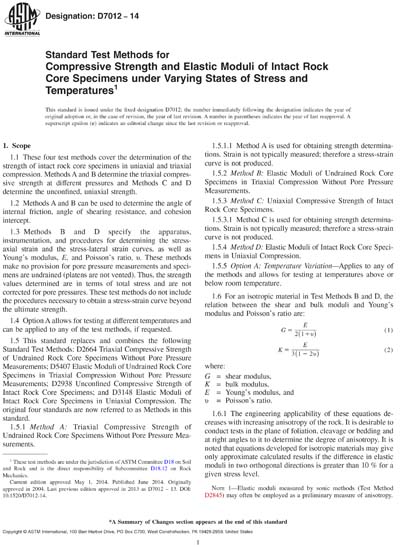Historical
ASTM D7012-14
Standard Test Methods for Compressive Strength and Elastic Moduli of Intact Rock Core Specimens under Varying States of Stress and Temperatures
1.1 These four test methods cover the determination of the strength of intact rock core specimens in uniaxial and triaxial compression. Methods A and B determine the triaxial compressive strength at different pressures and Methods C and D determine the unconfined, uniaxial strength.
1.2 Methods A and B can be used to determine the angle of internal friction, angle of shearing resistance, and cohesion intercept.
1.3 Methods B and D specify the apparatus, instrumentation, and procedures for determining the stress-axial strain and the stress-lateral strain curves, as well as Young's modulus, E, and Poisson's ratio, υ. These methods make no provision for pore pressure measurements and specimens are undrained (platens are not vented). Thus, the strength values determined are in terms of total stress and are not corrected for pore pressures. These test methods do not include the procedures necessary to obtain a stress-strain curve beyond the ultimate strength.
1.4 Option A allows for testing at different temperatures and can be applied to any of the test methods, if requested.
1.5 This standard replaces and combines the following Standard Test Methods: D2664 Triaxial Compressive Strength of Undrained Rock Core Specimens Without Pore Pressure Measurements; D5407 Elastic Moduli of Undrained Rock Core Specimens in Triaxial Compression Without Pore Pressure Measurements; D2938 Unconfined Compressive Strength of Intact Rock Core Specimens; and D3148 Elastic Moduli of Intact Rock Core Specimens in Uniaxial Compression. The original four standards are now referred to as Methods in this standard.
ASTM International [astm]

